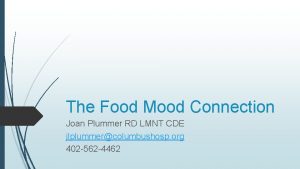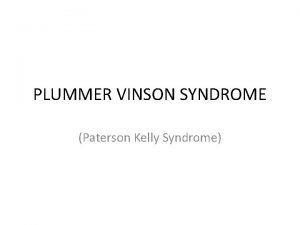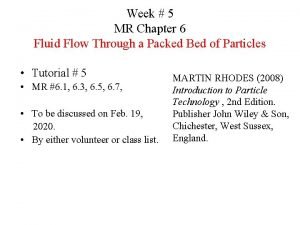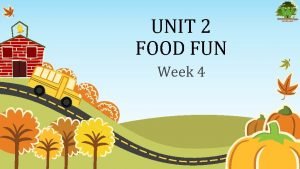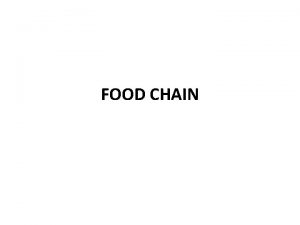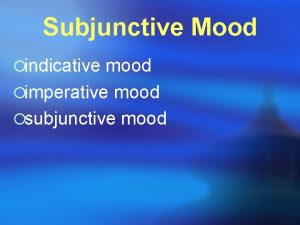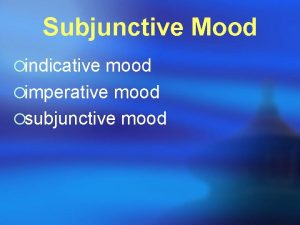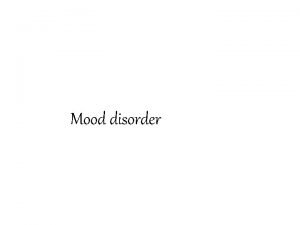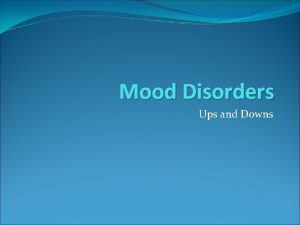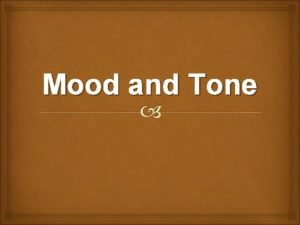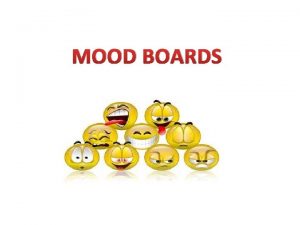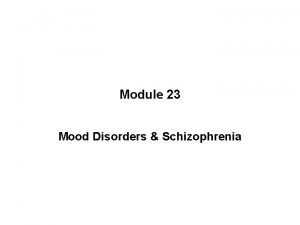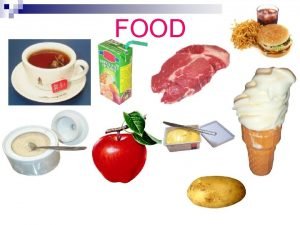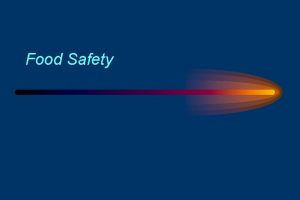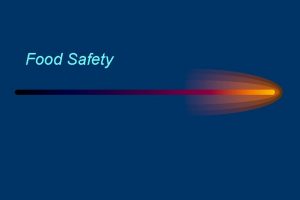The Food Mood Connection Joan Plummer RD LMNT


































- Slides: 34

The Food Mood Connection Joan Plummer RD LMNT CDE jlplummer@columbushosp. org 402 -562 -4462

The Brain Connection Brain functions best on premium fuel that contain vitamins, minerals, antioxidants and protect from oxidative stress. Can be damaged by anything other than premium fuel such as refined and processed foods- promote inflammation

The Gut Connection Good bacteria provide a strong barrier and limit inflammation Activate neural pathways that travel directly between the gut and the brain Probiotics may improve anxiety, perception of stress and mental outlook

Traditional vs Western Dietary Pattern Mediterranean and traditional Japanese dietfruits, vegetables, whole grains and fish- risk of depression 25 -35% lower Western diet- processed, refined foods and sugars – void of natural probiotics Unprocessed foods are fermented and act as natural probiotics – affect absorption of nutrients and activate neural pathways

Food and Mood Complex and depends on: Time of day Type and macronutrient composition of food Type and amount of food consumed Age and dietary history of the subject Male vs female

Studies: Spring et al, Michaud et al, Carbohydrate rich : females greater sleepiness, males greater calmness 40 years or older- impairment on a test after a high carb meal “Early birds” feel most productive the first part of the day and food choices at lunch and early afternoon most important

Studies: Spring et al, Michaud et al, “Night Owls” feel most energetic later in the day and should pay attention to breakfast choices to increase energy levels and cognitive function Large breakfast rich in protein could improve recall performance but might impair concentration Low carb diets increased feelings of anger, depression and tension. Higher carbohydrate diets generally had an uplifting effect on mood

Serotonin is an important neurotransmitter Regulates sleep, appetite, pleasure, motivation, and impulse control Produced from tryptophan contained in foods Found in clams, oysters, bananas, pineapple, plums, nuts, milk, turkey, spinach, eggs, sesame seeds, almonds, and avocados

Serotonin Theory suggests that diet rich in carbohydrates relieves depression and elevates mood in disorders such as carbohydrate craving obesity, pre-menstral syndrome and seasonal affective disorder High carbohydrates can change amino acid levels in the blood, blood sugar rises, insulin is released, muscles take up amino acids except tryptophan, binds to transporters and stimulate serotonin synthesis in the brain

Chocolate Contains a number of psychoactive chemicals which can stimulate the brain but not in small amounts Strong effect on moods, generally increasing pleasant feelings and reducing tension Unique taste and feel of chocolate in the mouth are responsible for chocolate cravings, so can be a powerful mood enhancer

Caffeine Contains stimulant effects enhancing alertness, vigilance and reaction time but also increases anxiety in susceptible individuals Most commonly used psychoactive substance in the world Blocks adenosine receptors in the brain and can relieve headaches, drowsiness and fatigue

Caffeine Can improve alertness and energy levels in those who have difficulty getting up in the morning Can cause unpleasant effects in people who have high levels of anxiety May exacerbate depression

Omega 3 Fatty Acids Brain is 60% fat Omega 3 Fatty acids can influence mood, behavior and personality Control brain processes-neurotransmitters Low levels are associated with depression, pessimism and impulsivity

Omega 3 Fatty Acids Improve cognitive function and lower depression by reducing inflammation Play a role in major depressive disorder, bipolar disorder, substance abuse and attention deficit disorder. Found in fish, seafood, flaxseed, chia seeds, hemp seeds, walnuts, and nut oils

B vitamins Deficiency of B vitamins associated with depression Insufficient thiamin caused introversion, inactivity, fatigue, decreased self confidence, poor sleep, poor concentration and poorer mood. Improved thiamin status increased well-being and energy levels. Found in fortified cereal grains, whole grains, leafy greens. legumes, pork, yeast, potatoes, cauliflower, oranges and eggs

B Vitamins Vitamin B 6, B 12, and folate are critical for optimal brain function. Help convert tryptophan to serotonin. Whole grains, leafy greens, legumes and most fruits are sources of B Vitamins.

Folate Low levels have been identified as a strong predisposing factor of poor outcome with antidepressant therapy Patients with low folate levels have a 25% higher risk of depression Found in whole grains, green leafy vegetables, orange juice, sunflower seeds, fortified foods.

Vitamin B 12 May delay the onset of signs for dementia Enhances cerebral and cognitive functions with elderly Animal products(meat, fish, and dairy)and nutritional yeast are sources of B 12

Vitamin D Increases levels of serotonin in the brain Needs depends on where you live, time of year, skin type and level of sun exposure Important with seasonal affective disorder Need 600 international units from foods Found in fortified milk, fish oils, salmon and the sun!

Iodine Plays an important role in mental health Provided by the thyroid hormone ensures the energy metabolism of the brain cells Found in iodized salt, saltwater fish and dairy products

Zinc levels are lower in those with clinical depression Oral zinc can influence the effectiveness of antidepressant therapy Protects the brain cells against the potential damage caused by free radicals Found in seafood, meats, greens and whole grains

Selenium With deficiency, may become irritable, anxious or depressed. Powerful antioxidant that plays a role in hormone synthesis. Found in mushrooms, seafood, sunflower seeds, whole grains, beans/legumes, brown rice, low fat dairy products, eggs, brazil nuts and walnuts

Magnesium Deficiency has been linked to depression Aids nerve function Found in wheat bran, green vegetables, nuts, chocolate, and legumes

Iron deficiency anemia can cause depressed mood, lethargy and problems with attention Foods rich in iron include red meats, vegetables such as broccoli, asparagus, seafood, iron fortified grains, greens, nuts, and dried fruit

Sugar and high glycemic low fiber foods – spike in blood sugar and energy but then crash- low energy and cranky Choose whole grains, plant based protein, and a small amount of fat to avoid the sugar crash. Eat low glycemic index high fiber foods closer to bedtime will give you a deeper sleep than high glycemic index foods

Mood Effect on Food Choice Anger and joy increases hunger Anger increases comfort and impulsive eating Joy increase eating for pleasure Sadness increased more less-healthy comfort foods Anxiety when eat foods high in calories- fear of gaining weight

Nutrition strategies for mood maintenance Eat often enough(every 3 -4 hours) – regular meals help blood sugars, continuous source of fuel- stable mood Don’t skip meals(especially breakfast)- get too hungry and overeat; lower fluency and problem solving, lack of energy, mood swings and motivation

Nutrition strategies for mood maintenance Know what to avoid- sugar, soda, candy, fruit juice syrup, refined starches and crackers, alcohol, trans fats(linked to depression) Choose beverages wisely – limit sugary drinks, and those with artificial sweeteners, colors, flavors and preservations. Green tea may reduce anxiety and sharpen mental focus while relaxing the mind.

Foods that will boost your mood Add protein to slow absorption of carbohydrates and release dopamine and norepinephrine. May increase alertness(eggs, poultry, seafood, tofu, low fat Greek yogurt, quinoa) Vitamin D may help relieve mood disorders such as seasonal affective disorder(milk, egg yolks, soy milk)

Foods That Will Boost Your Mood Folate may ease depression(broccoli, lentils, oatmeal, oranges, dark leafy greens) B 12 may also ease depression(cottage cheese, lean beef, salmon) Soluble fiber can increase serotonin(oats, beans, pears, peas, Brussel sprouts)

Don’t Banish Carbs –Just Choose Smart ones Need enough carb to boost tryptophan levels in the brain to produce serotonin Whole grains , fruits , vegetables, legumes Very low carb diet enhance fatigue and reduce desire to exercise and may precipitate depression

Eat a Balanced Breakfast Lots of fiber and nutrients, lean protein, good fats, and whole grain carbohydrates Boost memory, more energy throughout the day and feelings of calmness Skipping breakfast leads to fatigue and anxiety

Keep Exercising and Lose Weight Strong link between depression and obesity Leads to lower physical activity and higher calorie intake Slow weight loss can improve mood Fad diets –cutting calories and carb too much leads to irritability

Summary Diet rich in protein , moderate carbohydrate and low in fat improves mood and energy levels Choose an adequate supply of micronutrients such as omega 3 fatty acids, iron, folic acid, and thiamin. Avoid guilt by managing intake of craved foods to small amounts with meals and avoiding when hungry.
 Joan plummer
Joan plummer Joan plummer
Joan plummer Bolted connection
Bolted connection A325n bolts
A325n bolts Slip critical connection vs bearing connection
Slip critical connection vs bearing connection Text to text connections
Text to text connections Plummer vinson syndrome triad
Plummer vinson syndrome triad Plummer-vinson syndrome بالعربي
Plummer-vinson syndrome بالعربي Burke plummer equation
Burke plummer equation Ergun equation derivation
Ergun equation derivation Infantile swallow
Infantile swallow Unit 2 food food food
Unit 2 food food food Sequence of food chain
Sequence of food chain Mood food english file intermediate
Mood food english file intermediate Hát kết hợp bộ gõ cơ thể
Hát kết hợp bộ gõ cơ thể Bổ thể
Bổ thể Tỉ lệ cơ thể trẻ em
Tỉ lệ cơ thể trẻ em Gấu đi như thế nào
Gấu đi như thế nào Tư thế worms-breton
Tư thế worms-breton Alleluia hat len nguoi oi
Alleluia hat len nguoi oi Môn thể thao bắt đầu bằng từ chạy
Môn thể thao bắt đầu bằng từ chạy Thế nào là hệ số cao nhất
Thế nào là hệ số cao nhất Các châu lục và đại dương trên thế giới
Các châu lục và đại dương trên thế giới Công thức tiính động năng
Công thức tiính động năng Trời xanh đây là của chúng ta thể thơ
Trời xanh đây là của chúng ta thể thơ Mật thư tọa độ 5x5
Mật thư tọa độ 5x5 Phép trừ bù
Phép trừ bù độ dài liên kết
độ dài liên kết Các châu lục và đại dương trên thế giới
Các châu lục và đại dương trên thế giới Thể thơ truyền thống
Thể thơ truyền thống Quá trình desamine hóa có thể tạo ra
Quá trình desamine hóa có thể tạo ra Một số thể thơ truyền thống
Một số thể thơ truyền thống Cái miệng xinh xinh thế chỉ nói điều hay thôi
Cái miệng xinh xinh thế chỉ nói điều hay thôi Vẽ hình chiếu vuông góc của vật thể sau
Vẽ hình chiếu vuông góc của vật thể sau

